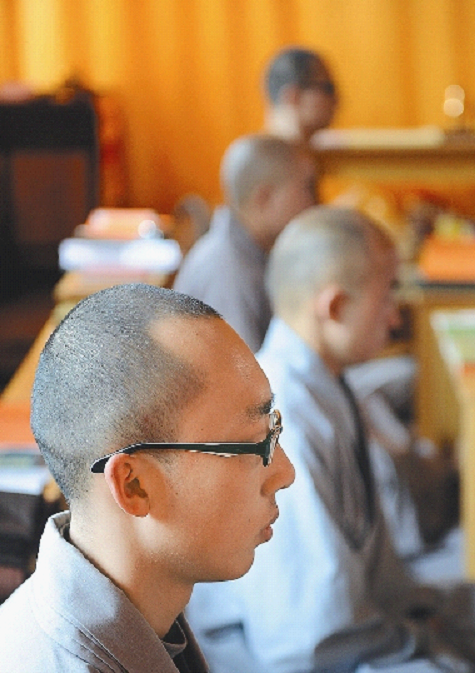|
||
|
||
|
||
|
||
HENAN Buddhist College (HBC) held an inauguration ceremony Sunday in Central China's Henan Province, marking the establishment of the first-ever higher institute dedicated to Buddhist education in the birthplace of Han Chinese Buddhism.
Located in the scenic Tongbai Mountain known for its monastic heritage, HBC covers an area of 6.96 hectares. The main architectural complex is in the style of the Tang Dynasty (618-907) and comprises a monastery, classrooms, an administrative building, residential quarters and Buddhist cultural center.
Venerable masters from temples at home and abroad, prominent scholars as well as Buddhist disciples from across the country gathered at Sunday's ceremony, presided over by Shi Yongxin, the incumbent abbot of Shaolin Temple and vice president of the Buddhist Association of China.
Zhang Lebin, vice president of China's State Administration for Religious Affairs, said the founding of HBC is significant in promoting the sound development of Buddhism in China and nurturing outstanding Sangha members with expertise.
Henan is known as the entry point of Buddhism from India into China nearly 2,000 years ago. It is in Henan that China's first Buddhist temple, Baima Temple (White Horse Temple), was established. Henan is also home to the ancestral temple of Zen Buddhism, Shaolin Temple, as well as China's first royal temple, the Daxiangguo Temple.
However, the shortage of qualified Sangha members poses a challenge to Chinese Buddhism in modern society. An official survey by Henan Provincial Buddhist Association showed that only 30 percent of the leaders of Henan's more than 500 temples have received proper higher education.
HBC emphasizes the study of the original Buddhist scriptures and literature, including the history of Buddhist thinking in India and the history of Buddhist schools in China, according to the Venerable Long Zang, HBC's vice president and dean.
"Besides the traditional practice and development of morality, meditation and wisdom, HBC also provides Sangha members with training courses in subjects such as English, computer science, and Buddhist painting," said the Venerable Long Zang.
The college has enrolled more than 40 students since it welcomed its first batch of students in March 2011.
"I definitely had a hard time adjusting myself to a vigorous daily schedule here in the college. But I know it takes time to truly comprehend the spirit of Buddha," said Tan Jing, a monk student originally from Beijing.
Ming Chen, a local monk student from Henan, explained why he decided to renounce the material world and be ordained as a monk. "The rampant moral corruption and money fetish have disillusioned me. To join the Sangha and study in the college is the best way for me to pursue the truth of life and benefit others."
"Education in a Buddhist college is neither vocational training nor the attainment of a piece of diploma. Instead, it's an education," said the Venerable Long Zang. "For a monk student, the best perspective upon graduation is to find a direction worth striving for," he added.(Xinhua)





